Answer these simple questions and we will find you the BEST prices
Which type of solar quotes do you need?
It only takes 30 seconds
100% free with no obligation

Tell us what you need to find a matching specialist

Get free quotes from professionals near you

Compare offers and choose the one that best matches your need
- whatcost.co.uk
- Best CWI for a New Build
What Is the Best Cavity Wall Insulation for a New Build?

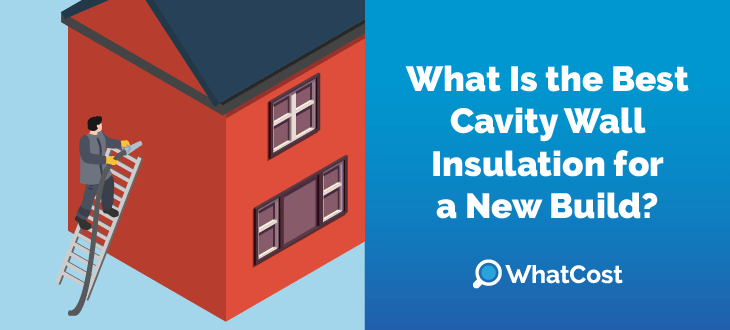
- The best budget-friendly cavity wall insulation is polystyrene beads, which provide sufficient thermal efficiency at an affordable price.
- Sprayfoam and rigid foam boards are the best cavity wall insulation for a new build if you are looking for maximum thermal efficiency.
- Cavity wall insulation is mandatory for new builds and must have a U-value of 0.30 W/m²K or lower according to the UK building regulations.
Finding the best cavity wall insulation for new builds is essential for energy efficiency and meeting UK regulations. Over 71% of homes in the have UK cavity walls, and around 14.8 million of these have cavity wall insulation, according to GOV.UK. Their popularity began in the 1920s and has continued to grow due to their ability to provide effective thermal insulation, durability, and prevention of moisture buildup.
On average, cavity wall insulation can reduce heat loss by up to 33%, resulting in savings between £110 and £470 on your energy bills annually, depending on your home type and location. However, the key in ensuring that your new build home benefits fully from cavity wall insulation installation is choosing the right new build insulation for your cavity walls.
In this WhatCost guide, we will provide you with the best cavity wall insulation for new builds by reviewing the options available in the UK, highlighting their advantages and disadvantages so that you can make the right decision for your home and budget!
The best way you can choose the best cavity wall insulation for your new build is by working with trusted insulation experts. But, the search can feel overwhelming. Luckily, WhatCost is here to help! By filling out our 30-second form, we can connect you with up to three free quotes from the best insulation specialist in your area. Click below to learn more about this great offer!
- Describe your needs
- Get free quotes
- Choose the best offer
It only takes 30 seconds



Best cavity wall insulation for a new build
The best cavity wall insulation for a new build depends on several factors which need to be considered, such as cost, thermal efficiency and sustainability. Since no single insulation type meets every requirement, it's essential to prioritise your specific needs and select the option that best aligns with what matters most for your project. Here are the best cavity wall insulation materials for new builds:
Mineral wool

Mineral wool is a dense fibre-based insulation material that offers good thermal efficiency, soundproofing and fire-resistance. Making it one of the best cavity wall insulation for new builds. However, while it is moisture repellant, if installed incorrectly, it can lead to cavity wall insulation causing damp in your home.
Mineral wool's R-value ranges between 3.7 and 4.3 per inch. Due to its high R-value, this material may not require additional layers to be installed. However, its density can pose a challenge for older or structurally weaker walls. While this is generally not an issue for new builds, it is important to consult a trusted installer before proceeding.
Depending on the type you choose, mineral wool insulation can cost between £13 and £17.50 per square meter, making it a more expensive new build cavity wall option.
Rigid foam boards
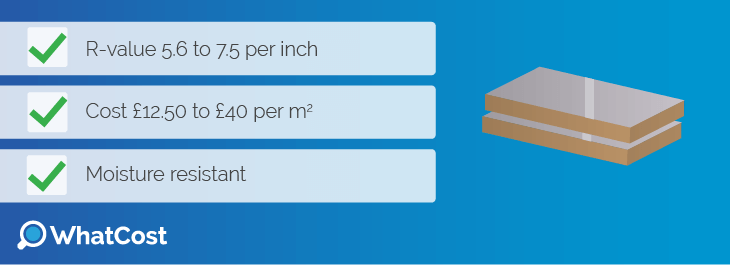
Rigid foam boards for cavity wall insulation in new builds come in PIR or phenolic boards. Both types offer excellent thermal efficiency and moisture resistance. PIR boards offer an R-value between 5.6 and 7.0 per inch, while phenolic boards' R-value ranges from 6.7 to 7.5 per inch, making rigid foam boards one of the best cavity wall insulation for new builds in terms of thermal efficiency.
Depending on the thickness and type you choose, rigid foam boards can range between £12.50 to £40 per m2, which is more expensive than other new build insulation options available in the UK. Additionally, rigid foam boards do require a larger cavity wall gap to install these boards, which may be an issue for thinner cavity walls. Although more expensive, it is highly effective in maintaining a dry cavity and reducing heat loss.
Polystyrene beads
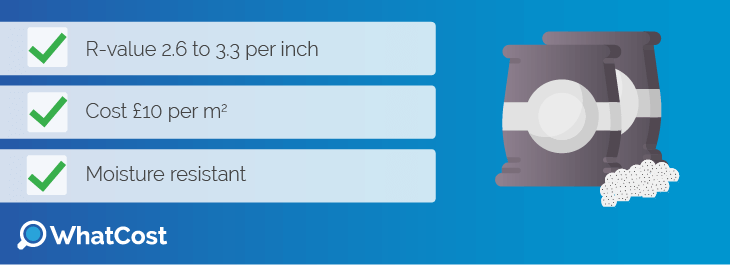
Expanded polystyrene beads are a popular choice for new build insulation due to their excellent heat retention, moisture resistance, and durability. Their quick installation method involves blowing the beads into cavity walls, ensuring even coverage and minimising gaps.
With an R-value ranging from 2.6 to 3.3 per inch and an average cost of around £10 per square meter, polystyrene beads provide effective thermal insulation at a reasonable price. However, improper installation can lead to gaps, allowing moisture to accumulate and potentially causing mould and mildew issues. Polystyrene beads are not an eco-friendly option, as their production releases harmful fumes, which may be a concern for those prioritising sustainability.
Cellulose
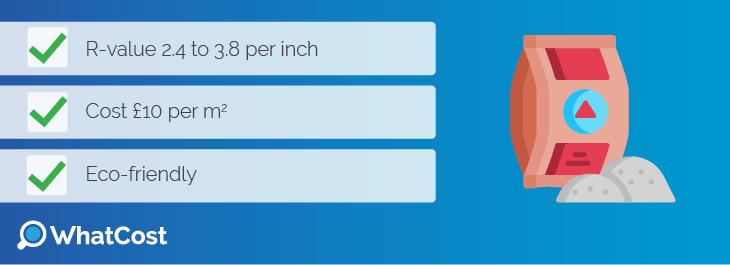
Cellulose insulation is made from recycled paper and treated with boric acid to protect it from fire, pests and mould. Due to its recyclable material, cellulose is considered one of the best cavity wall insulation for new builds if you want a sustainable and eco-friendly option.
Cellulose has an R-value of 2.4 to 3.8 per inch and typically costs around £10 per square meter. While it may be lower in thermal efficiency, its sustainability and low cost make it a desirable choice. However, while cellulose is treated with boric acid to protect it from moisture build-up, it can still absorb water, which may reduce its thermal efficiency in damp conditions. This can be an unsuitable choice for areas in the UK prone to damp weather conditions. Additionally, the potential for moisture build-up can lead to mould and mildew growth over time.
Spray foam
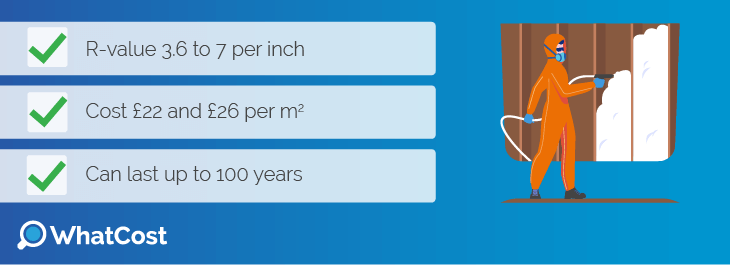
Spray foam cavity wall insulation is one of the best cavity wall insulation materials for new builds. When applied in liquid form, it expands to fill the entire cavity, creating an airtight seal. These airtight seals allow for excellent thermal efficiency as well as acting as a barrier against moisture which helps reduce the risk of condensation.
Spray foam has an R-value ranging from 3.6 to 7 per inch, depending on the type of spray foam used. Its cost can range from £22 and £26 per square meter, making it one of the most expensive insulation options for new build cavity walls. While expensive, this material can last up to 100 years if installed correctly meaning its durability will offset the initial cost.
While its airtight seal is beneficial, improper installation can lead to issues such as condensation, overheating, and even carbon monoxide buildup if adequate ventilation is not maintained.
How to choose the best cavity wall insulation for your new build
Choosing the best cavity wall insulation for new builds can be a complex process and requires you to prioritise your needs and preferences. While the above materials are some of the best available, ultimately the decision should be based on your requirements. By understanding the key factors, you can make a well-informed decision.
Thermal efficiency
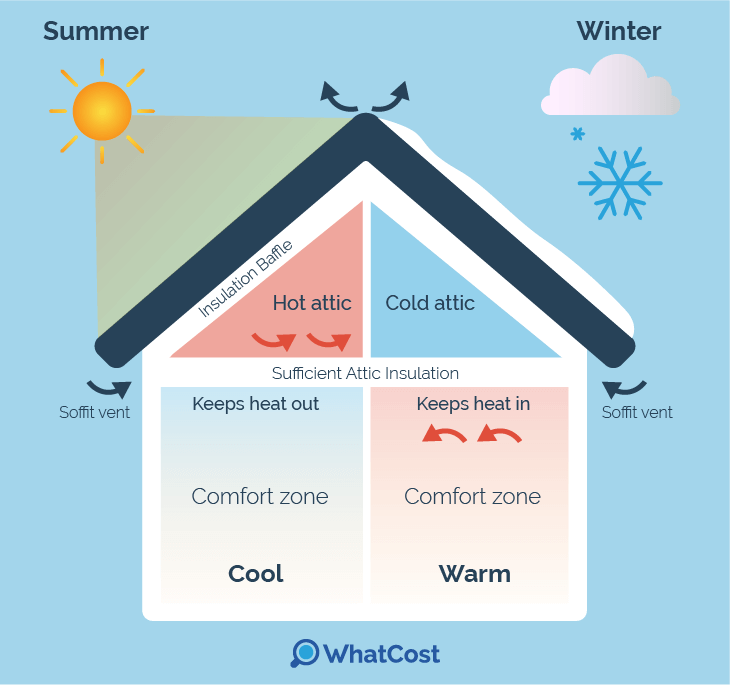
Each new build cavity wall insulation material has a different ability to retain heat. If reducing heat loss and enhancing comfort are your key priorities in your new build insulation, then you should consider materials that will help you lower the U-value of your cavity wall.
A U-value measures how much heat escapes through a material such as a cavity wall, roof, or window. The lower the U-value, the better that material is at retaining heat.
To lower the U-value of your cavity wall and improve overall thermal efficiency, you can opt for insulation materials with a high R-value. The R-value of a material shows how well it resists the flow of heat. The higher the R-value of a material, the better it will be at reducing the U-value. The best cavity wall insulation for new builds based on thermal performance would be spray foam or rigid foam boards as they have a high R-value, which will ensure maximum thermal efficiency in your newly built cavity walls.
Building regulations

As of 1995, building regulations in the UK made insulation in cavity walls mandatory. Failure to meet these regulations can lead to a halt in construction as well as fines. This isn’t the only regulation that you should be aware of for new build cavity walls, however.
Building regulations in the UK state that the U-value of a cavity wall should be 0.30 W/m2K or lower. This requirement aims to minimise heat loss in homes by improving efficiency and lowering heating costs. To achieve this U-value, you will need to opt for an insulation material with a good R-value.
If you choose a material with a lower R-value due to other reasons such as cost restraints, it is important to note that it will need to be layered several times to achieve the desired U-value. This can add to additional costs, so you may want to weigh out that factor. Ultimately, this regulation will impact the choice of insulation material you make.
Another key regulation to consider is the recommended cavity gap, which should be at least 150mm thick. A wider cavity allows for the use of insulation with a lower R-value, as you can layer it to achieve the necessary U-value. This flexibility can help balance performance with cost when selecting insulation for your new build.
Moisture resistance

Many areas in the UK are prone to damp and harsh weather conditions. Choosing the best cavity wall insulation for new builds in these areas should focus on materials that are moisture-resistant. By opting for an insulation material that is moisture resistant, you can prevent the build-up of water in your cavity walls, which can lead to mould and mildew growth. This can ultimately affect the structure of your cavity walls and damage the interior of your home.
Budget

Costs of cavity wall insulation in new builds play an important role. If you are on a budget then factoring in the costs of labour and insulation materials is essential. While it is tempting to opt for cheaper insulation materials, it is important to note that some of these materials may not have the same qualities such as thermal efficiency and durability as others.
For example, sprayfoam insulation is one of the most expensive materials you can choose. However, if installed correctly, it can last up to 100 years, making it a long-term investment. In contrast, cellulose insulation is a more affordable option but may settle over time, creating gaps that reduce effectiveness and may require future repairs.
When budgeting for cavity wall insulation, it's also important to consider long-term savings. Materials with a higher R-value tend to cost more upfront, but they offer better thermal efficiency, which can lead to lower energy bills over time. Investing in high-quality insulation may ultimately save you money in the long run. By weighing out the initial costs with potential savings you can determine which is the best cavity wall insulation for your new build.
Sustainability

If making your home greener and reducing your carbon footprint is a priority then you can help offset your carbon emissions by choosing more sustainable insulation materials for your cavity walls. There are several ways you can approach this:
- Selecting a recyclable material like cellulose, which is made from recycled paper, helps reduce waste and promote sustainability.
- Choosing an insulation material with a long lifespan, such as spray foam, can also be a sustainable option. While its production may release toxic chemicals, its durability means fewer replacements over time, reducing material consumption and lowering overall energy use, which helps decrease your carbon footprint.
- Opting for natural materials like sheep’s wool, which has a low embodied carbon footprint during production, supports eco-friendly building practices while providing effective insulation.
The best way to choose the best cavity wall insulation for a new build is through thorough research on different materials. However, this can be a time-consuming process. Working with a trusted professional can help simplify the decision-making, ensuring you choose the most suitable insulation for your needs.
Here WhatCost, we make it easy to find the right insulation specialist. Fill out our quick 30-second form, and we’ll connect you with up to three free quotes from top-rated professionals in your area. Click below to learn more!
- Describe your needs
- Get free quotes
- Choose the best offer
It only takes 30 seconds



Get multiple cavity wall insulation quotes for your new build
Choosing the best cavity wall insulation for new builds is a big decision that affects both your home's thermal efficiency and energy costs. By comparing multiple quotes from different insulation specialists, you can find the best option at a competitive price.
However, searching for the right specialist can be a time-consuming process, with homeowners often spending hours researching companies without clear results.
Luckily, WhatCost has a solution for you! By filling out our 30-second form, we can provide you with three free, no-obligation quotes from the very best insulation companies in your area. Don’t miss this easy and convenient way to save time and money. Click below to learn more.
- Describe your needs
- Get free quotes
- Choose the best offer
It only takes 30 seconds



FAQ
The best cavity wall insulation for new builds depends on your personal preferences such as cost, durability, moisture resistance, sustainability and thermal efficiency.
Spray foam and rigid foam boards are among the most effective cavity wall insulation options due to their high R-values, which help reduce heat loss and keep your home warmer for longer.
Yes, UK building regulations require all new builds to have cavity wall insulation to improve energy efficiency and reduce heat loss.
The building regulations in the UK for cavity wall insulation state that all new build cavity walls must have insulation. Additionally, the U-value of your cavity walls must be 0.30 W/m2K or lower and the cavity wall gap must be 150mm thick to accommodate insulation materials.

Caoimhe is an experienced content writer and researcher who is passionate about providing accessible information to every reader. With a background in English literature and Sociology, she combines the two disciplines to create cohesive, well-thought-out, and well-informed pieces.
